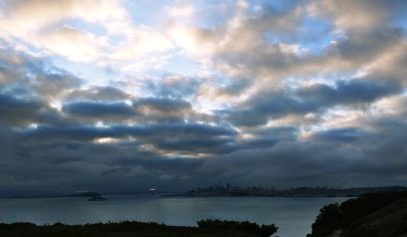“Now is the Winter of our Discontent…”
So begins the Shakespeare play about the corrupt and manipulative thirst for power and short reign of King Richard III. Centuries later, John Steinbeck borrowed this opening line for the title of his final novel, Winter of our Discontent (1961), a pessimistic tale about the dishonest and ruthless measures taken by the main character, Ethan Allen Hawley, to seek success in a decaying Long Island seaport that once flourished with a fleet of square-rigged whaling ships.

One may draw parallels between these works of literary genius and today, and ask, “Will our Winter be one of discontent?” There are plenty of reasons to think that many people around the Bay will suffer this Winter from disease, disharmony, and disparity.
Yet we can also draw upon countless other writings and real life examples that take a less pessimistic tack: challenges met, achievements honestly attained, contentment found. We need look no farther than the Sausalito writing studio of Isabelle Allende to find A Long Petal to the Sea (2019) and read about the “ship of hope.” Other Sausalito novelists such as Amy Tan and Ciji Ware have created uplifting story lines.
The story at Call of the Sea is not a work of historical fiction. In recent weeks, we sailed safely with cohorts of students on schooner Seaward, hosted Marin City youth after school, sent girls aloft, took passengers of all ages on heritage sails, and even had brigantine Matthew Turner featured in the centerfold (G rated, of course) of the Marlinspike magazine. Ours were the only tall ships sailing regularly on the Pacific Coast. None of this could have been achieved without the continued support of volunteers, donors, crew, and others booking passage and spreading the word.
We now approach the Winter having achieved what many thought could not be done. We are coping with the twin challenges of Covid and limited finances. As a result of our performance this Fall, we gained a measure of confidence that we can sustain our programs.
One particular performance deserves special mention. On November 8, as Matthew Turner rounded Point Blunt toward the lee side of Angel Island, an ominous violet wall beat toward the ship. Tumultuous whitecaps churned up. A double rainbow stood out against the dark cloud.

Captain Adrian McCullough immediately commanded, “Hands to braces!” Mate Rebecca Johnson and crew called back, “Hands to braces!” and prepared to brace the yards and wear ship. Turner turned quickly and sailed before the thirty knot wind toward the San Francisco waterfront, straining to outrun the squall.
But no, Captain McCullough pointed to the advancing danger and gave the command to lower the sails. It all happened so fast. As it began to hail, the crew sprang into action and the sails came down. Then, just as quickly, the squall passed, and the excited and soaked passengers, including some small children, clapped and shouted their approval.
This brief episode–Matthew Turner’s first encounter with a squall– serves as an allegory for how we can serve our mission for years to come. By working together, quickly responding to threats, we can stay safely afloat.
Our Winter will not be one of discontent. It will be dangerous, challenging, and commanding all hands to braces.
“… A SQUALL, upon a sudden,
Came o’er the waters scudding;
And the clouds began to gather,
And the sea was lashed to lather,
… And the ship, and all the ocean,
Woke up in wild commotion.”
From The White Squall (1844), a poem by William Makepeace Thackary

